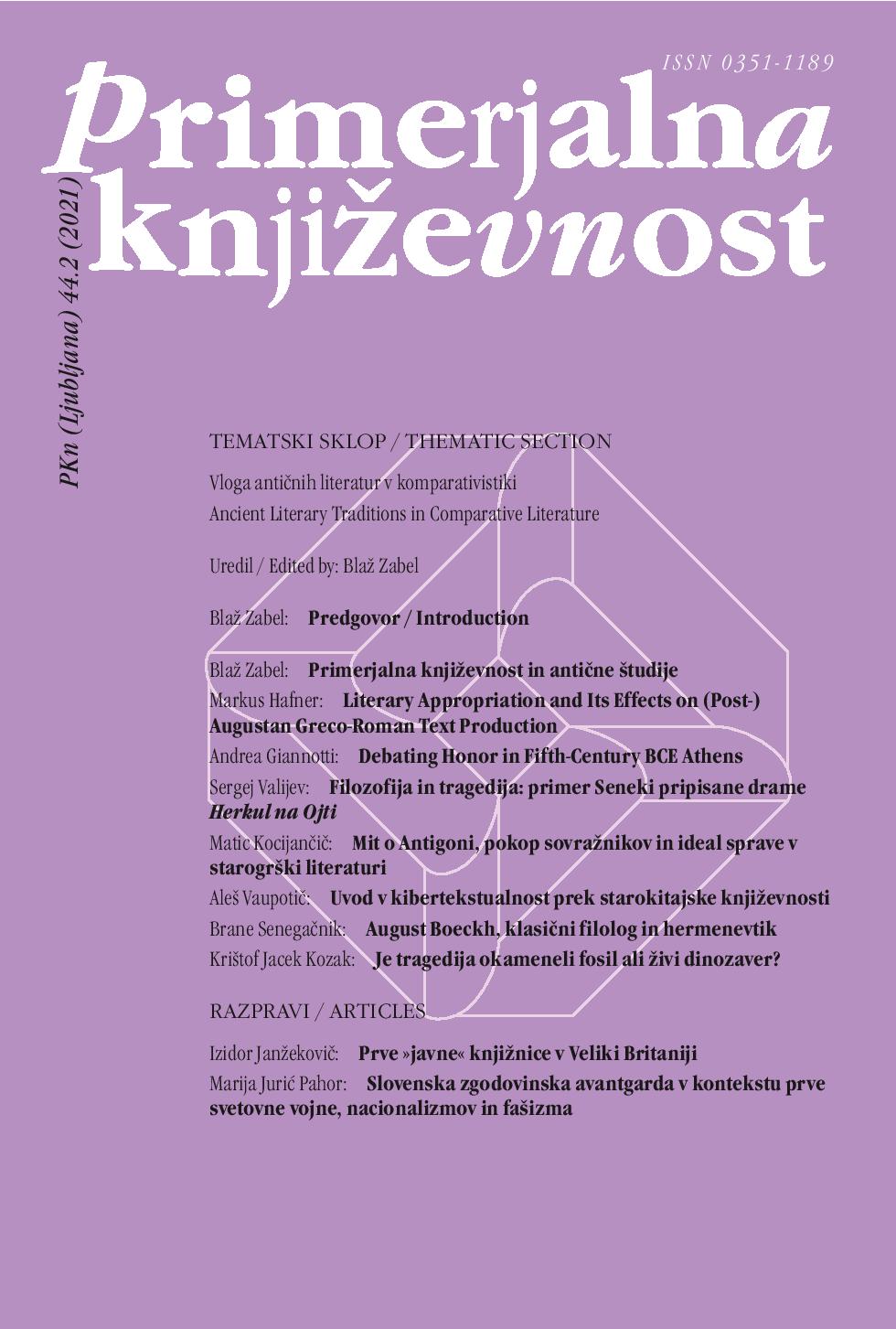Philosophy and Tragedy: The Case of Hercules on Oeta, a Play Ascribed to Seneca
DOI:
https://doi.org/10.3986/pkn.v44.i2.04Keywords:
Latin literature, Seneca: Hercules on Oeta, stoic philosophy, apotheosis, DeianeiraAbstract
In the play Hercules on Oeta (Hercules Oetaeus), which is a dramatic representation of the story about Hercules and Deianeira, evident lines of stoic philosophy can be traced. The easiest recognisable indication of it is the emphasized dramatic position of the Hercules’s apotheosis. Thus, this drama gains explicit metaphysical and cosmic character. Despite the fact that this philosophic point is more emphasized than in the Sophocles’s tragedy Trachiniae, which was undoubtedly the main literary example of the drama, the psychological insights, linked especially with Deianeira’s reaction to the Iole’s arrival, should not be neglected. Here we witness a real labyrinth of emotions coming to light in long monologs and tense dialogs, which present complex Deianeira’s inner world. In tough existential condition, she decided for fatal deed, thus inflicting on Hercules the mortal wound. However, it is not only her husband who is dying, but also, as she states herself, the saviour and defender of the world. Binding in himself together the individual and the cosmic in full accordance with stoic thought, character of Hercules exceeds the limits of human individuality. His last and most difficult labour is confrontation with his own death. This is the last challenge of his heroism, challenge, which ultimately grants him the apotheosis he longed for arduously.
References
Basore, John W., izd. in prev. <em>Seneca: Moral Essays</em>. 2. zv. Cambridge, MA: Harvard University Press, 1932.
Easterling, Patricia E. <em>Sophocles. Trachiniae</em>. Cambridge: Cambridge University Press, 2004.
Fitch, John G., izd. in prev. <em>Seneca. Oedipus. Agamemnon. Thyestes. Hercules on Oeta. Octavia</em>. Cambridge, MA: Harvard University Press, 2018.
Fitch, John G., izd. in prev. <em>Seneca. Hercules. Trojan Women. Phoenician Women. Medea. Phaedra</em>. Cambridge, MA: Harvard University Press, 2018.
Fuhrmann, Manfred. <em>Geschichte der römischen Literatur</em>. Ditzingen: Reclam, 1999.
King, Christine M. »Seneca’s ‘Hercules Oetaeus’: A Stoic Interpretation of the Greek Myth«. <em>Greece & Rome</em> 18.2 (1971): 215–222.
Larson, Victoria T. »The ‘Hercules Oetaeus’ and the Picture of the ‘Sapiens’ in Senecan Prose«. <em>Phoenix</em> 45.1 (1991): 39–49.
Lefèvre, Eckard. <em>Studien zur Originalität der römischen Tragödie. Kleine Schriften</em>. Berlin: de Gruyter, 2015.
Littlewood, Cedric A. J. »Hercules Oetaeus«. <em>Brill’s Companion to Seneca</em>. Ur. Gregor Damschen, Andreas Heil in Maria Waide. Leiden; Boston, MA: Brill, 2014. 515–520.
Long, Anthony A. »Soul and Body in Stoicism«. <em>Phronesis</em> 27.1 (1982): 34–57.
Manuwald, Gesine. <em>Roman Republican Theatre</em>. Cambridge: Cambridge University Press, 2011.
Mark Avrelij. <em>Dnevnik cesarja Marka Avrelija</em>. Prev. Anton Sovre, priredil Kajetan Gantar. Ljubljana: Slovenska matica, 1988.
Pack, Roger A. »On Guilt and Error in Senecan Tragedy«. <em>Transactions and Proceedings of the American Philological Association</em> 71 (1940): 360–371.
Paratore, Ettore. »Lo HERCULES OETAEUS è di Seneca ed è anteriore di FURENS«. <em>Acta Classica</em> 1 (1958): 72–79.
Pohlenz, Max. <em>La Stoa. Storia di un movimento spirituale</em>. 2. zv. Prev. Ottone de Gregorio. Firence: La nuova Italia, 1967.
Rozelaar, Mark. »Neue Studien zur Tragödie <em>Hercules Oetaeus</em>«. <em>Aufstieg und Niedergang der römischen Welt. Geschichte und Kultur Roms im Spiegel der neueren Forschung</em>. Ur. Hildegard Temporini in Wolfgang Haase. Berlin: de Gruyter, 1985. 1348–1419.
Gummere, Richard M., izd. <em>Seneca. Ad Lucilium Epistulae Morales</em>. 1.–3. zv. Cambridge, MA; London: Harvard University Press; William Heinemann, 1917–1925.
Summers, Walter. »The Authorship of the Hercules Oetaeus«. <em>The Classical Review</em> 19.1 (1905): 40–54.
Trinacty, Christopher. »Senecan Tragedy«. <em>Cambridge Companion to Seneca</em>. Ur. Shadi Bartsch in Alessandro Schiesaro. Cambridge: Cambridge University Press, 2015. 27–40.
Wolf, Hartmut F. »Sprache und Stil des Hercules Oetaeus«. <em>Hermes</em> 82.1 (1954): 51–84.


